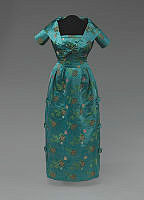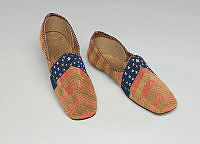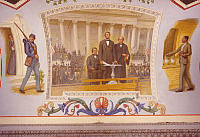Rubenstein Center Scholarship
Frederick Douglass and Abraham Lincoln
This article is part of the Slavery in the President’s Neighborhood initiative. Explore the Timeline
Frederick Douglass was born into slavery in 1818 along the Eastern Shore of Maryland. During his childhood, the wife of one of his owners taught Douglass the alphabet. Later, she was forbidden to continue because slave literacy was illegal in Maryland. Undeterred, young Douglass taught himself, recognizing that education could be “the pathway from slavery to freedom.”1 Experiencing the cruelty and moral injustices of the institution of slavery, Frederick Douglass successfully fled to the North in 1838 at age twenty by posing as a free black sailor and traveling via the Underground Railroad. Over the next six decades, he worked tirelessly to advocate for enslaved and free African Americans, rising to prominence in the United States government and throughout the entire country.
Upon arrival in New York City in 1838, Douglass was officially a free man, but he was also aware that there was much to be done to free those still in bondage. Douglass relocated to Massachusetts where he attended antislavery meetings and read abolitionist literature. In 1841, Douglass met William Lloyd Garrison, a famous abolitionist and editor of The Liberator, and began working for the cause as an orator—telling his story throughout New England and encouraging the end of slavery.2 After moving to Rochester, New York, in 1843, he and his wife Anna Murray-Douglass began facilitating the movement of enslaved fugitives to Canada via the Underground Railroad.

Frederick Douglass, pictured here in 1876, was the most photographed man in nineteenth century America.
Library of CongressAfter publishing Narrative of the Life of Frederick Douglass: An American Slave in 1845 and founding his own antislavery newspaper, The North Star, two years later, Douglass was the most famous African-American man in the country.3 He decided to break ties with Garrison, his one-time mentor, believing that African Americans should lead the American abolition movement. Meanwhile, his eloquent speeches outlining the moral indignities of slavery garnered national attention, and bolstered the popularity of abolitionism throughout the country. In 1852, Douglass gave what is now his best-known speech, lamenting the state of American racial inequality: “What to a Slave is the Fourth of July?”
What, to the American slave, is your 4th of July? I answer; a day that reveals to him, more than all other days in the year, the gross injustice and cruelty to which he is the constant victim. To him, your celebration is a sham… There is not a nation on the earth guilty of practices more shocking and bloody than are the people of the United States, at this very hour.4
Douglass was also very involved in national politics, and as the presidential election of 1860 approached, he advocated for candidates with strong antislavery platforms. American voters received a ballot crowded with four candidates: Abraham Lincoln (Republican), John C. Breckenridge (Southern Democrat), Stephen A. Douglas (Democrat), and John Bell (Constitutional Union). Douglas’s belief in “popular sovereignty,” Breckenridge’s pro-slavery platform, and Bell’s aversion to the issue entirely left Frederick Douglass to endorse Lincoln and the Republicans, whom he believed were more antislavery than the divided Democrats.5 With four primary candidates, a breakaway sect of the Democratic Party, and the hotly contested issue of slavery, the election itself was highly complex. Abraham Lincoln, elected president with less than forty-percent of the popular vote, successfully earned the majority of Electoral College votes. After the election, Frederick Douglass eloquently outlined the benefits of Lincoln’s presidency:
What, then, has been gained to the anti-slavery cause by the election of Mr. Lincoln? Not much, in itself considered, but very much when viewed in the light of its relations and bearings... Lincoln's election … has taught the North its strength, and shown the South its weakness. More important still, it has demonstrated the possibility of electing, if not an Abolitionist, at least an anti-slavery reputation to the Presidency of the United States.6

This political cartoon depicts presidential candidates tearing apart the U.S. map, emphasizing the divided nature of the country over the election of 1860
Library of CongressAt the same time, Lincoln’s antislavery sentiments were lacking in the eyes of Douglass. While he is known to many today as the “Great Emancipator,” Abraham Lincoln’s own views on slavery were more multifaceted and convoluted than that title might imply, evolving significantly during the four years of his presidency.7 Upon his inauguration, his moral outrage toward slavery was clear, but he made no political effort to outline a plan to emancipate millions of enslaved people throughout the country. His opinions often vacillated between the need to end the moral injustices of slavery while also gradually finding the “proper” solution for a country in turmoil. Early in his presidency, he sought to mollify slave states by preserving their constitutional right to maintain the practice of slavery. In many ways, Lincoln’s true feelings about slavery were veiled by his desire to maintain the Union. Despite these intentions, his election to the presidency triggered the secession of southern states, and the Civil War began only a few months later in April 1861.
The two leaders shared a complicated relationship during Lincoln’s time in office. President Lincoln’s support of colonization efforts to displace free black Americans offended and angered Douglass. Lincoln, along with many antislavery politicians, believed that black and white Americans could not peacefully coexist post-emancipation. Thus, he proposed sending freed African Americans to Liberia or Central America—an idea popularized by the American Colonization Society, whose past members included former U.S. presidents Thomas Jefferson, James Madison, and James Monroe.8 On August 14, 1862, President Lincoln invited a delegation of prominent black leaders (interestingly, this did not include Frederick Douglass) to the White House in order to discuss these ideas. Lincoln’s proposition illuminated the limits of his ideas on equality: “It is better for us both to be separated… You may believe you can live in Washington or elsewhere in the United States the remainder of your life… This is (I speak in no unkind sense) an extremely selfish view of the case.”9 Click here to learn more about the enslaved households of President Thomas Jefferson, James Madison, and James Monroe.
What, to the American slave, is your 4th of July? I answer; a day that reveals to him, more than all other days in the year, the gross injustice and cruelty to which he is the constant victim. To him, your celebration is a sham… There is not a nation on the earth guilty of practices more shocking and bloody than are the people of the United States, at this very hour.
Frederick Douglass published a scathing response in Douglass’ Monthly:
In this address Mr. Lincoln assumes the language and arguments of an itinerant Colonization lecturer, showing all his inconsistencies, his pride of race and blood, his contempt for Negroes and his canting hypocrisy… though elected as an anti-slavery man by Republican and Abolition voters, Mr. Lincoln is quite a genuine representative of American prejudice and Negro hatred and far more concerned for the preservation of slavery, and the favor of the Border Slave States, than for any sentiment of magnanimity or principle of justice and humanity.10
Though highly critical of Lincoln’s sluggishness toward emancipation and his support of the racist underpinnings behind colonization, Douglass also respected the president, especially following the implementation of the Emancipation Proclamation on January 1, 1863. In Douglass’ Monthly, he wrote:
Abraham Lincoln… in his own peculiar, cautious, forbearing and hesitating way, slow, but we hope sure, has, while the loyal heart was near breaking with despair, proclaimed and declared: That on the First of January, in the Year of Our Lord One Thousand, Eight Hundred and Sixty-three, All Persons Held as Slaves Within Any State or Any Designated Part of a State, The People Whereof Shall Then be in Rebellion Against the United States, Shall be Thenceforward and Forever Free.11
Within the article, Douglass praised President Lincoln for the decision and assured readers of its legitimacy: “Abraham Lincoln may be slow, Abraham Lincoln may desire peace even at the price of leaving our terrible national sore untouched, to fester on for generations, but Abraham Lincoln is not the man to reconsider, retract and contradict words and purposes solemnly proclaimed over his official signature.”12
As the Civil War continued to rage, Douglass dedicated himself to recruiting African-American soldiers and encouraging equal pay and treatment for the enlisted. He recruited his sons, Charles and Lewis, to join the Fifty-Fourth Massachusetts Infantry Regiment and mass-produced broadsides of his enlistment speech: “Men of Color to Arms!” in March 1863.13 To further his cause, Douglass decided to pay the president a visit at the White House on August 10, 1863. At this meeting, he urged the president to improve the treatment of African-American soldiers fighting to save the country. Douglass offered many critiques on the Union’s misconduct toward black soldiers, and the president listened to his requests respectfully with rapt attention. More importantly, Douglass illuminated the importance of African-American enlistment for the Union cause, and Lincoln gave him permission to recruit in the South.14

Douglass’s mass-produced broadside urging men of color to join the Union cause
201 Collection of the Smithsonian National Museum of African American History and CultureOne year later, Douglass was invited back to the White House to discuss Lincoln’s emancipation efforts; specifically, the president sought advice on how “to induce the slaves in the rebel States to come within the Federal lines” in order to ensure their freedom—especially with an election on the horizon, which Lincoln feared he might lose. At this meeting, prior tension between the two men began to disappear, and Douglass commented in his autobiography that “What [Lincoln] said on this day showed a deeper moral conviction against slavery than I had even seen before in anything spoken or written by him.”15
After President Lincoln’s second inauguration in 1865, Douglass met with him for the last time. Douglass made the trip to Washington, D.C. to hear the president’s speech, and later attempted to visit him at the White House. White doorkeepers initially barred his entrance, based solely upon his race. However, Douglass negotiated his way into the East Room, where he was happily received by his foe-turned-friend. There, Lincoln said, “I am glad to see you. I saw you in the crowd to-day, listening to my inaugural address…Douglass; there is no man in the country whose opinion I value more than yours. I want to know what you think of it.”16 This meeting, where a formerly-enslaved man was greeted by the American president as a “man among men,” resonated with Douglass for the rest of his life.17

Lincoln’s favorite walking stick, gifted to Douglass after his assassination
FRDO 1898, Cane, Courtesy of the National Park Service, Frederick Douglass National Historic SiteLess than two months later, President Lincoln was assassinated by John Wilkes Booth during a trip to Ford’s Theater in Washington, D.C. Following his death, First Lady Mary Todd Lincoln sent Douglass her husband’s “favorite walking staff” in recognition of the relationship between the two men, and the impact that Douglass’s advice had had on the president.18 Douglass—as Lincoln’s friend, critic, and adviser—perhaps best summarized his thoughts about the president during a speech in 1876, given during the unveiling of the Freedman’s Monument in the nation’s capital:
Abraham Lincoln was not, in the fullest sense of the word, either our man or our model…He was preeminently the white man’s President, entirely devoted to the welfare of white men… though the Union was more to him than our freedom or our future, under his wise and beneficent rule we saw ourselves gradually lifted from the depths of slavery to the heights of liberty and manhood.19

The Emancipation Memorial in Washington, D.C., paid for by donations from emancipated African Americans across the country and unveiled in 1868
Library of CongressAbout eight months after Lincoln’s assassination, the thirteenth Amendment was ratified, formally abolishing slavery throughout the country.20 Frederick Douglass continued to fight for racial equality during the Reconstruction era, focusing on African-American voting rights, women’s suffrage, and equality for all Americans. Later in his life, he served the country in many different capacities, working in the administrations of Ulysses S. Grant, Rutherford B. Hayes, James Garfield, and Benjamin Harrison in various positions including U.S. Marshal of the District of Columbia, Recorder of Deeds, and Consul General to Haiti.21 Click here to learn more about the enslaved households of President Ulysses Grant. His legacy is inestimable—a man born into slavery, who became the voice of a movement and a trailblazer who illuminated the path to equality in a time of vast disparity. His death in 1895 ushered in a new era of African-American activism led by intellectuals such as Booker T. Washington and W. E. B. Du Bois, who carried the legacy of Douglass’s cause forward into an uncertain century.
Special thanks to Ka'mal McClarin at the Frederick Douglass National Historic Site for assistance with this article.










